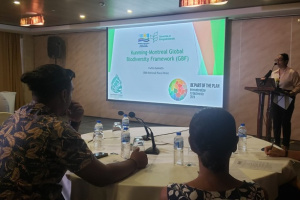Seychelles pushes for tuna proposal at ocean commission to help increase its catch limit

Nirmal Shah said that most coastal states, including Seychelles, have never had historical catches because they did not have a local fleet catching tuna. (Seychelles Fishing Authority)
Seychelles joins nine other member countries in bringing forth a proposal on the allocation of fishing opportunities for Indian Ocean Tuna Commission’s (IOTC) species at the 22nd session being held in Bangkok, Thailand from May 21-25.
The commission, responsible for the management of tuna species in the Indian Ocean, states that all countries should have a fair share of these species.
In an interview with Seychelles’ head of delegation, Nirmal Jivan Shah, it was outlined that the issue lies in the way that quotas are allocated to each country.
“The main principle is that you base it on historical catches within a country’s Exclusive Economic Zone (EEZ). The problem is that most coastal states, including Seychelles, have never had historical catches because we did not have a local fleet catching tuna,” said Shah, who is also the chairperson at the Seychelles Fishing Authority.
He added that “distant water fishing nations want 90 percent of what they have caught to be theirs and the coastal countries get 10 percent.” Shah said that this will leave coastal states with low allocations.
“It not only disadvantages the country but it also disadvantages present and future generations of Seychelles, who would presumably want the tuna fisheries to be sustainable so that we continue to make money from and maybe they will venture into it because opportunities and technologies will change,” he said.
Seychelles, an archipelago in the western Indian Ocean has an Exclusive Economic Zone is 1.37 million square kilometres and fisheries is the second top contributor to its economy.
Proposal K on the agenda states “that all historical catches taken inside an EEZ of a country, irrespective of who caught it will be attributed to the coastal state and all historical catches taken on the high seas, to the catching state.”
A communique provided by Shah states that the proposal caters for temporary transfers of the catch, which can be taken anywhere, in an EEZ or the high seas and is very beneficial for coastal states as they can trade their excess allocation to distant water fishing nations. This will allow distant water fishing nations to continue their operations on the high seas and EEZ of coastal states where they have access, allowing these countries to continue with the Fisheries Partnership Agreement with the distant water fishing nations.
The proposal is co-sponsored by Maldives, South Africa, Australia, Indonesia, Kenya, Mozambique, Pakistan, Seychelles, Sri Lanka and Tanzania.
Another proposal that Seychelles is bringing to the meeting is on a scoping study of the socio-economic indicator of IOTC fisheries. This revised proposal is requesting the commission to carry out a study to look at the impact the commission’s decisions have on countries, communities and businesses.
“Our revised proposal is based on comments made in the last meeting, for IOTC to look at what kind of data can be gathered to look at the socio-economic impacts. This is important to us as tuna fishing is so important for Seychelles,” said Shah.
This proposal is being co-sponsored by Comoros, Kenya, Mauritius, Sri Lanka and Tanzania.
Seychelles, together with Maldives, co-sponsors a third proposal on the conservation of mobula and manta rays caught in association with fisheries in the commission’s area of competence.
The proposal is calling on cooperating non-contracting parties (CPCs) to prohibit their flagged vessels from setting a purse seine net on a school of tuna associated with manta and mobula rays in the IOTC convention area if the animal is sighted before nets are set.
“This is important for the Maldives as they have a huge ecotourism programme around manta and other types of rays,” said Shah.
Altogether there are 14 proposals to be discussed in the meeting.





